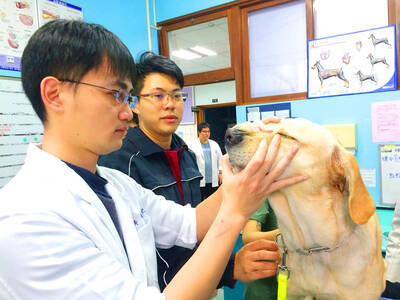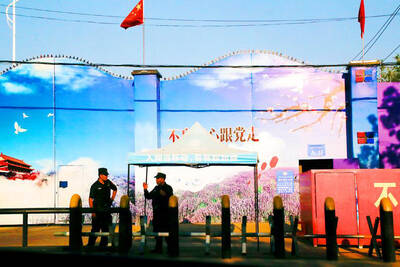The government yesterday warned the public about the risk of visiting Hong Kong after the Standing Committee of China’s National People’s Congress passed national security legislation for the territory, while President Tsai Ing-wen (蔡英文) said she was disappointed about the law.
The security legislation imposed on Hong Kong sets the stage for the most radical changes to the former British colony’s way of life since it returned to Chinese rule 23 years ago.
The new law would “severely impact” freedom, democracy and human rights in Hong Kong, the Executive Yuan said in a statement, adding that Taiwan would continue to offer help to Hong Kong people.
“The move severely impacts Hong Kong society’s freedom, human rights and stability. The government strongly condemns it and reiterates its support for the people of Hong Kong as they strive for democracy and freedom,” Executive Yuan spokesman Ting Yi-ming (丁怡銘) said.
Authorities in Beijing and Hong Kong have repeatedly said the legislation is aimed at a few “troublemakers” in Hong Kong and would not affect rights and freedoms, nor investor interests.
Nevertheless, Ting warned Taiwanese of “possible risks” when visiting Hong Kong in light of the legislation. He did not elaborate.
Months of anti-government, pro-democracy protests in Hong Kong last year won widespread sympathy in Taiwan, which has welcomed people from Hong Kong who have moved to the country and expects more to come.
Tsai, who in May became the first government leader anywhere to pledge measures to help Hong Kongers who leave due to what they see as tightening Chinese controls, said she was “very disappointed” by China’s imposition of the law.
“We hope Hong Kong people continue to adhere to the freedom, democracy and human rights that they cherish,” she told reporters.
Taiwan is set to launch today a dedicated office to help those thinking of fleeing Hong Kong. July 1 is also the anniversary of day Hong Kong returned to Chinese rule from the UK in 1997 with the promise of wide-ranging freedoms under a “one country, two systems” formula.
Tsai said the legislation proved that the formula “was not feasible” and that Taiwan would provide “concrete” humanitarian assistance to migrants from Hong Kong.
Beijing denies stifling Hong Kong’s freedoms and has condemned Tsai’s offer.

Former Czech Republic-based Taiwanese researcher Cheng Yu-chin (鄭宇欽) has been sentenced to seven years in prison on espionage-related charges, China’s Ministry of State Security announced yesterday. China said Cheng was a spy for Taiwan who “masqueraded as a professor” and that he was previously an assistant to former Cabinet secretary-general Cho Jung-tai (卓榮泰). President-elect William Lai (賴清德) on Wednesday last week announced Cho would be his premier when Lai is inaugurated next month. Today is China’s “National Security Education Day.” The Chinese ministry yesterday released a video online showing arrests over the past 10 years of people alleged to be

THE HAWAII FACTOR: While a 1965 opinion said an attack on Hawaii would not trigger Article 5, the text of the treaty suggests the state is covered, the report says NATO could be drawn into a conflict in the Taiwan Strait if Chinese forces attacked the US mainland or Hawaii, a NATO Defense College report published on Monday says. The report, written by James Lee, an assistant research fellow at Academia Sinica’s Institute of European and American Studies, states that under certain conditions a Taiwan contingency could trigger Article 5 of NATO, under which an attack against any member of the alliance is considered an attack against all members, necessitating a response. Article 6 of the North Atlantic Treaty specifies that an armed attack in the territory of any member in Europe,

LIKE FAMILY: People now treat dogs and cats as family members. They receive the same medical treatments and tests as humans do, a veterinary association official said The number of pet dogs and cats in Taiwan has officially outnumbered the number of human newborns last year, data from the Ministry of Agriculture’s pet registration information system showed. As of last year, Taiwan had 94,544 registered pet dogs and 137,652 pet cats, the data showed. By contrast, 135,571 babies were born last year. Demand for medical care for pet animals has also risen. As of Feb. 29, there were 5,773 veterinarians in Taiwan, 3,993 of whom were for pet animals, statistics from the Animal and Plant Health Inspection Agency showed. In 2022, the nation had 3,077 pediatricians. As of last

XINJIANG: Officials are conducting a report into amending an existing law or to enact a special law to prohibit goods using forced labor Taiwan is mulling an amendment prohibiting the importation of goods using forced labor, similar to the Uyghur Forced Labor Prevention Act (UFLPA) passed by the US Congress in 2021 that imposed limits on goods produced using forced labor in China’s Xinjiang region. A government official who wished to remain anonymous said yesterday that as the US customs law explicitly prohibits the importation of goods made using forced labor, in 2021 it passed the specialized UFLPA to limit the importation of cotton and other goods from China’s Xinjiang Uyghur region. Taiwan does not have the legal basis to prohibit the importation of goods